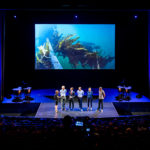 Beyond donations to the local community and composting, what other big-picture solutions are there for reducing food waste? Last year’s Zero Food Waste Forum in Berkeley came up with this one: Just eat it.
Beyond donations to the local community and composting, what other big-picture solutions are there for reducing food waste? Last year’s Zero Food Waste Forum in Berkeley came up with this one: Just eat it.
Attendees at the one-day forum, which took place at the Anna Head Alumnae Hall in October 2014, dined on meals that had been recovered from another meeting. “We discovered there was a Salesforce [Dreamforce conference], a huge event, in San Francisco, and they had hundreds and hundreds of boxed lunches left over,” said Jordan Figueiredo, co-chair of the forum and creator of both endfoodwaste.org and the @UglyFruitandVeg campaign. Figueiredo and his co-chair, Dana Gunders, project scientist, food and agriculture for the Natural Resources Defense Council, had the food transported from the larger event across the bay to their 270-person gathering.

As attendees — activists, academics, writers, and filmmakers among them — discussed novel ways to reduce food waste, they “walked their talk,” noshing on leftover veggie and chicken wraps, donated pizza, and persimmons and prickly-pear fruit that had been foraged from the streets of the Bay Area. The meal illustrated in real time how much perfectly edible food goes to waste — in the U.S., over 30 to 40 percent of the food supply. “For the most part, people in zero waste are content with throwing every bit of leftover food in the compost, and that’s fine,” Figueiredo said. “I’ve noticed more and more of my colleagues talking about these higher solutions.”
At the forum were British Columbia filmmakers Jen Rustemeyer and Grant Baldwin, who made the 2014 award-winning film “Just Eat It,” about their quest to subsist on foraged and dumpster-dived food for six months. Rustemeyer, who tipped Convene off about the Zero Food Waste Forum, seems empathetic to the dilemma that meeting planners face when it comes to having enough food at their events, while also remaining cognizant of waste. “Meeting professionals are definitely caught in the middle,” she said. “Hopefully, more and more of their clients ask for sustainability, such as composting, and appreciate [planners] straight-up telling the audience that they are trying to reduce food waste — so they understand that the staff won’t swap out buffet trays until they are empty, and that there is a plan for donation. People are receptive if they just know why it’s being done.”
While only about half of what attendees ate at the forum was rescued, by an organization called Foodshift — “When you have a conference setting, and you want to provide a breakfast, lunch, and coffee, it’s difficult to have every little piece recovered,” Figueiredo said — a few days later, the Feeding the 5000 Oakland event served thousands of people a free meal that was fully recovered, gleaned, or donated. For that event, “We recovered 11,000 pounds [of food], and 9,000 of it was whole, in boxes or bags,” Figueiredo said. Among the meal’s courses was strawberry-kale-chard smoothies. “Smoothies work really well for recovered produce,” Figueiredo added.




